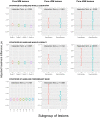Remyelination varies between and within lesions in multiple sclerosis following bexarotene
- PMID: 36116011
- PMCID: PMC9539389
- DOI: 10.1002/acn3.51662
Remyelination varies between and within lesions in multiple sclerosis following bexarotene
Abstract
Objective: In multiple sclerosis chronic demyelination is associated with axonal loss, and ultimately contributes to irreversible progressive disability. Enhancing remyelination may slow, or even reverse, disability. We recently trialled bexarotene versus placebo in 49 people with multiple sclerosis. While the primary MRI outcome was negative, there was converging neurophysiological and MRI evidence of efficacy. Multiple factors influence lesion remyelination. In this study we undertook a systematic exploratory analysis to determine whether treatment response - measured by change in magnetisation transfer ratio - is influenced by location (tissue type and proximity to CSF) or the degree of abnormality (using baseline magnetisation transfer ratio and T1 values).
Methods: We examined treatment effects at the whole lesion level, the lesion component level (core, rim and perilesional tissues) and at the individual lesion voxel level.
Results: At the whole lesion level, significant treatment effects were seen in GM but not WM lesions. Voxel-level analyses detected significant treatment effects in WM lesion voxels with the lowest baseline MTR, and uncovered gradients of treatment effect in both WM and CGM lesional voxels, suggesting that treatment effects were lower near CSF spaces. Finally, larger treatment effects were seen in the outer and surrounding components of GM lesions compared to inner cores.
Interpretation: Remyelination varies markedly within and between lesions. The greater remyelinating effect in GM lesions is congruent with neuropathological observations. For future remyelination trials, whole GM lesion measures require less complex post-processing compared to WM lesions (which require voxel level analyses) and markedly reduce sample sizes.
© 2022 The Authors. Annals of Clinical and Translational Neurology published by Wiley Periodicals LLC on behalf of American Neurological Association.
Conflict of interest statement
William Brown reports consultancy fees, advisory board work and speaking fees from Novartis, Biogen and Intesso. Robin Franklin reports personal fees from Frequency Therapeutics and Rewind Therapeutics, outside the submitted work. Siddharthan Chandran reports funding from Phenotherapeutics, outside the submitted work. Declan Chard is a consultant for Hoffmann‐La Roche. In the last 3 years he has been a consultant for Biogen, has received research funding from Hoffmann‐La Roche, the International Progressive MS Alliance, the MS Society, the Medical Research Council, and the National Institute for Health Research (NIHR) University College London Hospitals (UCLH) Biomedical Research Centre, and a speaker's honorarium from Novartis. He co‐supervises a clinical fellowship at the National Hospital for Neurology and Neurosurgery, London, which is supported by Merck.
All other authors declare no competing interests of relevance to the current work.
Figures


References
Publication types
MeSH terms
Substances
Grants and funding
LinkOut - more resources
Full Text Sources
Medical

